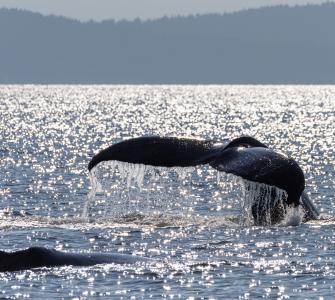Cetaceans—whales, dolphins, and porpoises—are found in every world ocean. Several whale species migrate along the coastlines of entire continents between their summer and winter feeding grounds. In the past several years, the ecosystem services of cetaceans have been the focus of several studies in order to understand their value and impact on human and natural ecosystems.
Beyond their intrinsic value, cetaceans play a significant role in broader marine ecosystem services. Their excrement serves as a fertilizer for phytoplankton, facilitating their growth. Phytoplankton themselves contribute massively to the oxygen in our atmosphere through their own carbon capture. This nutrient cycling has broader impacts not only on carbon sequestration but on the nutrients available to fisheries.
Though much research has been conducted on ecological and biophysical contributions of cetaceans, less has been done translating these contributions into economic value. To facilitate the economic valuation of ecosystem services provided by cetaceans, CSF is conducting a pilot project based on one species/population and developing a framework to assess specific ecosystem service value for this and other cetacean species.
The provision of ecosystem services requires the whole ecosystem, which is not only defined by its components, but mainly by the interaction webs built within which species can potentially influence other species; these interactions can include both biological processes (e.g., competition, predation, and mutualism) and physicochemical processes (e.g., nutrients, impact on water limitation, and temperature). Therefore, species that play a role in supporting ecosystem functions and services at the same time depend on other species and abiotic elements in the ecosystem.
In the case of cetaceans, their role in contributing to support the provision of ecosystem services have gained interest in the past decade, with studies focusing mainly on ecological and biophysical analysis, which are the bases to conduct economic analysis. Yet, we acknowledge the still nascent understanding of the contribution of cetaceans to ecosystem services, especially with respect to carbon cycling. Given this, in this project we will utilize a conservative approach to estimating the potential value of these services, particularly with respect to carbon sequestration and nutrient cycling.
CSF worked closely with the IWC Secretariat, the IWC Conservation Committee Working Group on Cetaceans and Ecosystem Functioning and experts from the IWC Scientific Committee Standing Working Group on Ecosystem Modeling.
The project produced:
- a research framework to assess the economic role of cetaceans in supporting marine ecosystem services;
- a general case study applying the above framework and relevant models to a chosen species/population; and
- guidelines on how to use these valuations to influence whale conservation and management, e.g. through market or policy developments.
Having a better understanding of the role that cetaceans play in providing multiple benefits to people will provide a stronger voice for these marine mammals in the decision making table, catalyzing efforts to protect and restore their populations. This work will not only help cetaceans thrive, the framework we are developing can be applied to any species around our planet so we can better work with nature in a symbiotic development
The project is funded by the International Whaling Commission.
__
Photo: Humpback Whale, Vancouver by Marcello Hernández-Blanco

